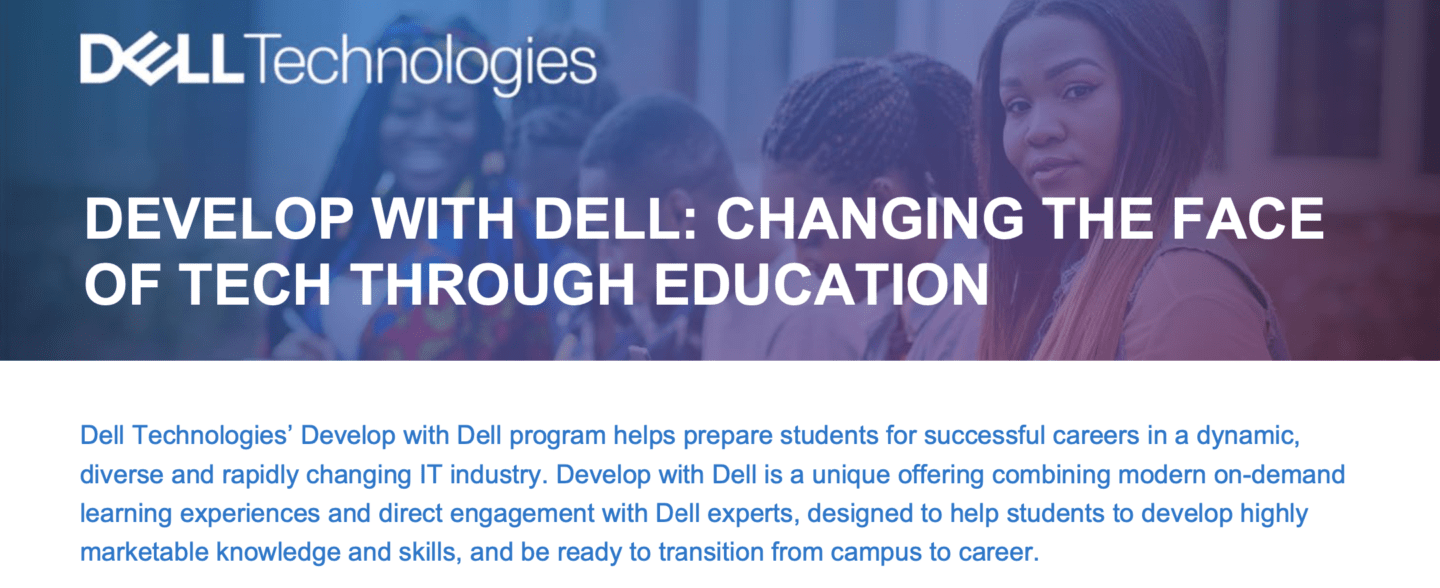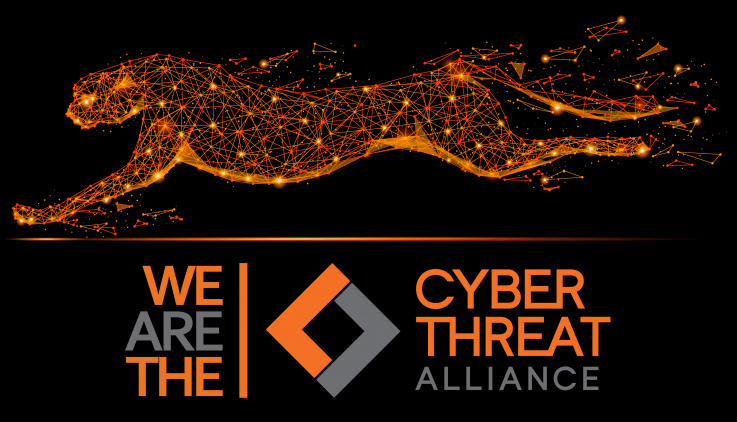To mark Cybersecurity Awareness Month, join us for a discussion that explores the importance of enhancing the cybersecurity of AI systems and incorporating AI to bolster proactive cybersecurity measures.
Category: Uncategorized
Innovation Across America: ITI’s President & CEO Visits Minnesota
Technology provides critical services and economic opportunities to communities across the U.S. in unique ways. As part of ITI’s Bridge for Innovation campaign, we are highlighting innovation across America. ITI’s President and CEO Jason Oxman toured ITI members’ innovative and impactful work in Minnesota.
Jason’s first stop was in Bloomington, Minnesota, where he visited Seagate’s operations and wafer fabrication in action. Seagate manufactures innovative and advanced hard drives that enable technologies like cloud computing, artificial intelligence, and high-performance computing.
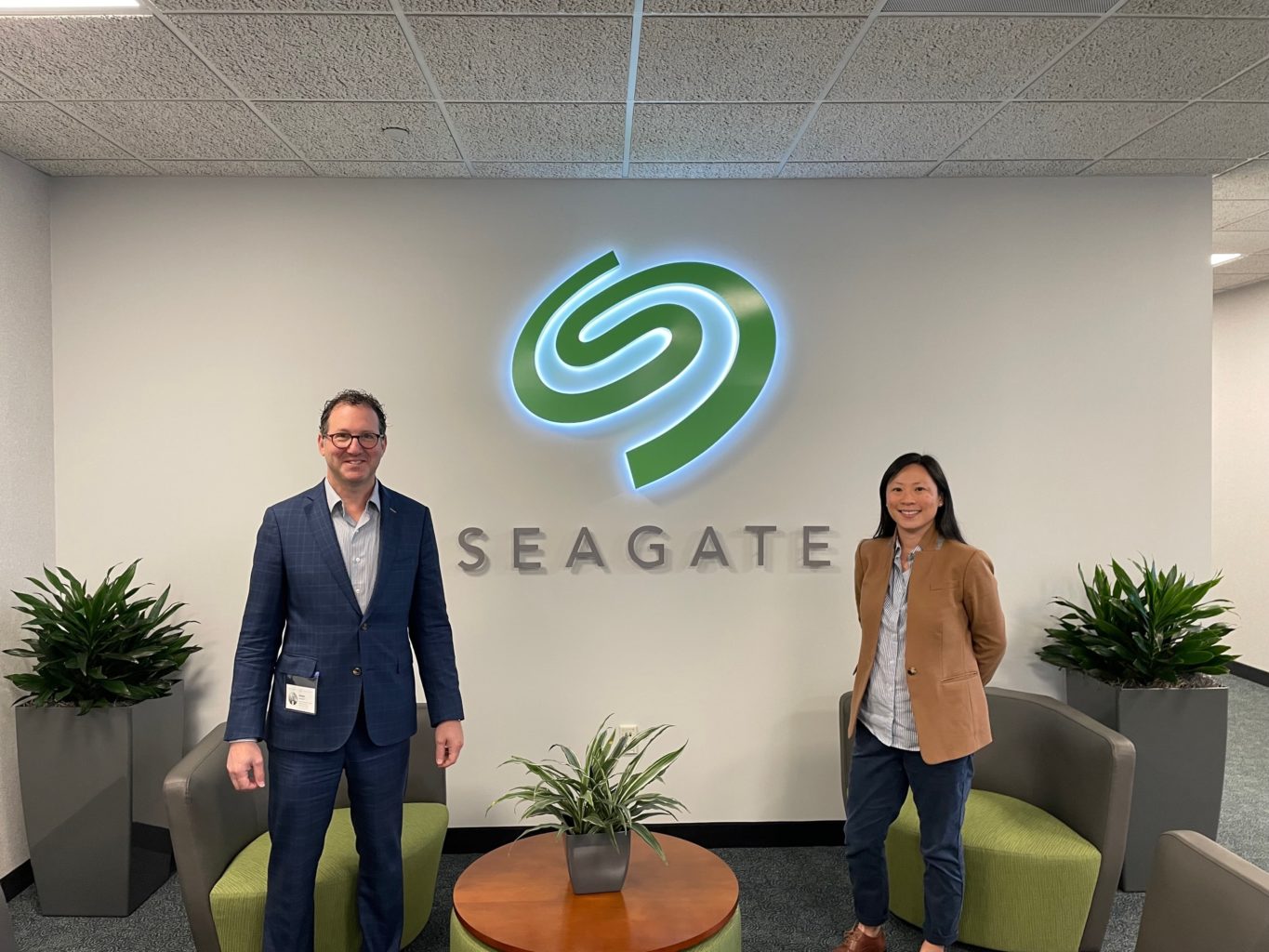
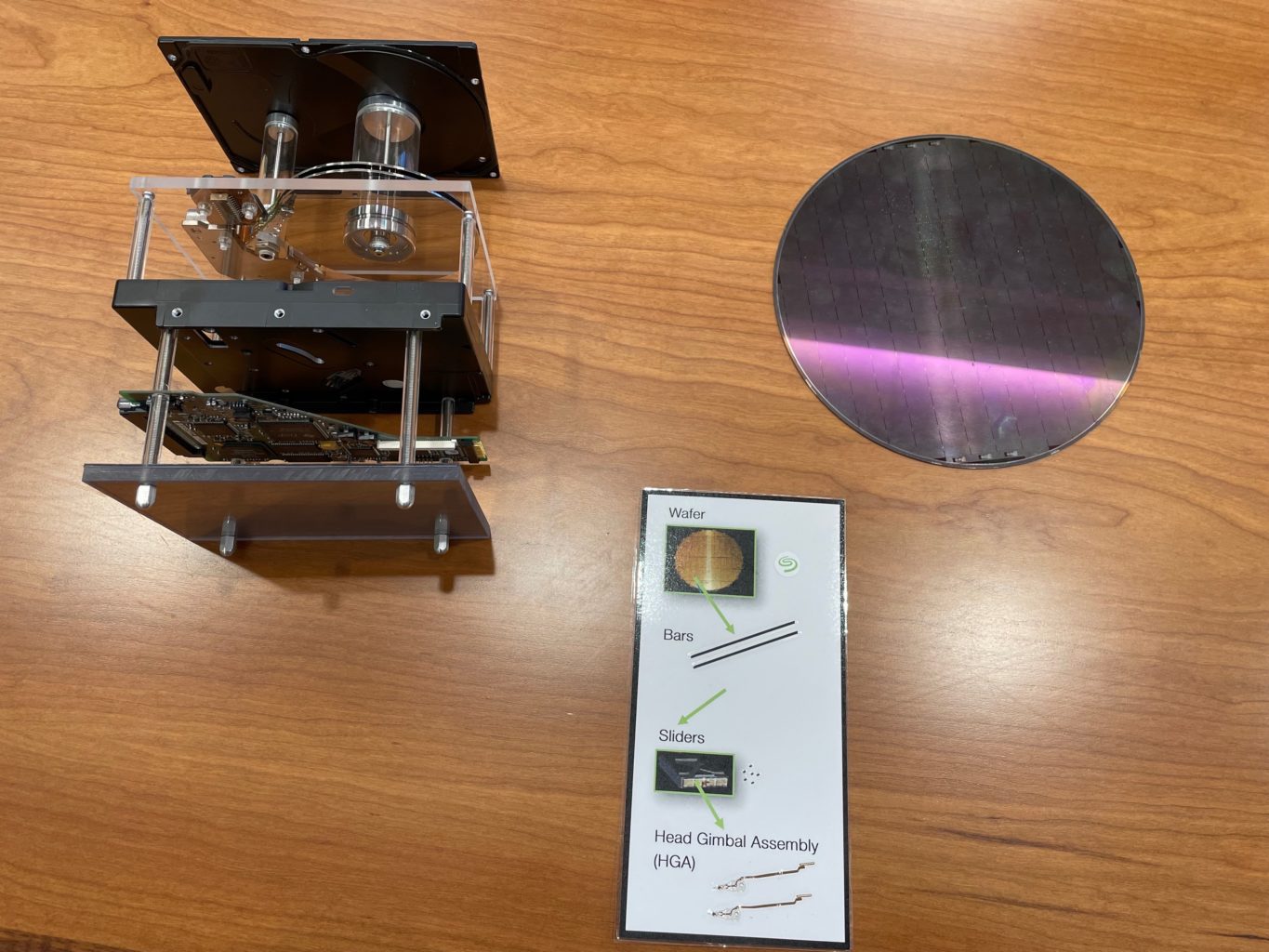
He also visited Medtronic’s Operational Headquarters in Fridley, Minnesota. There he learned about the groundbreaking healthcare technology solutions being developed at Medtronic. Medtronic uses data-driven solutions to improve health and health care for communities across the United States.
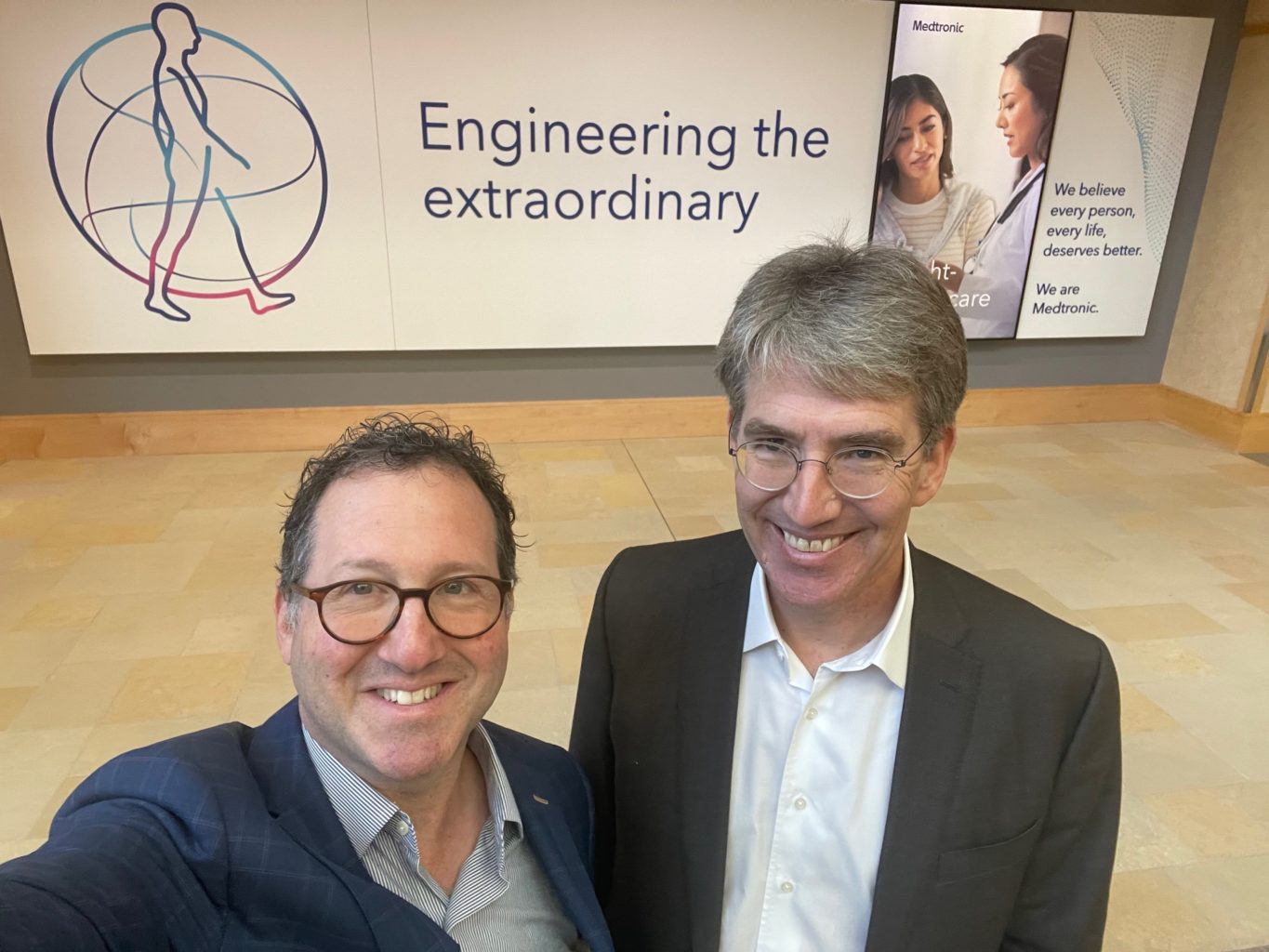
You can learn more about how the tech industry is helping drive innovation and competition throughout the United States here and its impact in the state of Minnesota. Stay tuned for the next Innovation Across America trip.
Strong Supply Chains Critical to Infrastructure Funding
Innovation Across America: ITI’s President & CEO Visits New Jersey and New York
The tech industry drives progress in many visible ways: building products, supporting the economy, and securing infrastructure. As part of ITI’s Bridge for Innovation campaign, we are highlighting innovation across America. ITI’s President and CEO Jason Oxman toured ITI members’ innovative and impactful work in New Jersey and New York.
Jason’s first stop was in Secaucus, New Jersey. There, he visited ZT Systems and learned about how they are providing solutions to the world’s leading cloud and telecom service providers. ZT Systems helps people all over the world connect, learn, play, explore, and innovate through providing support for hyperscale cloud computing and digital infrastructure providers.
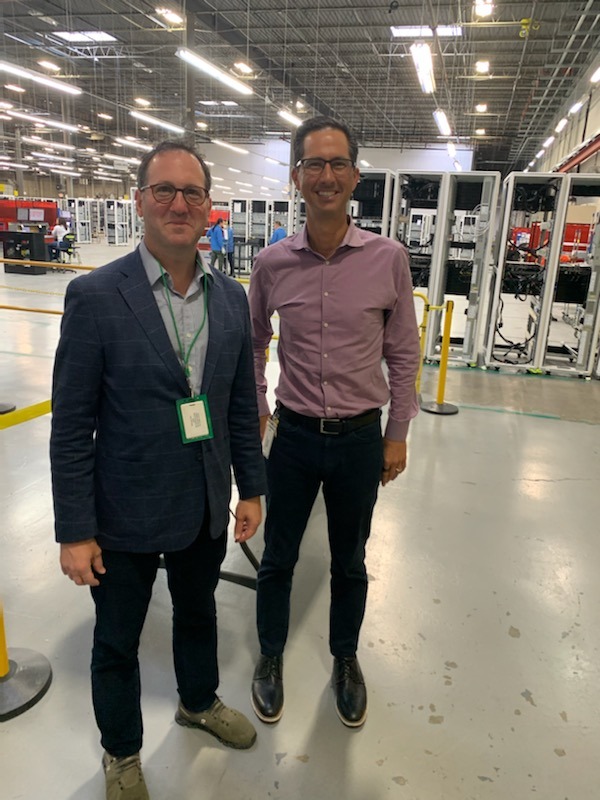
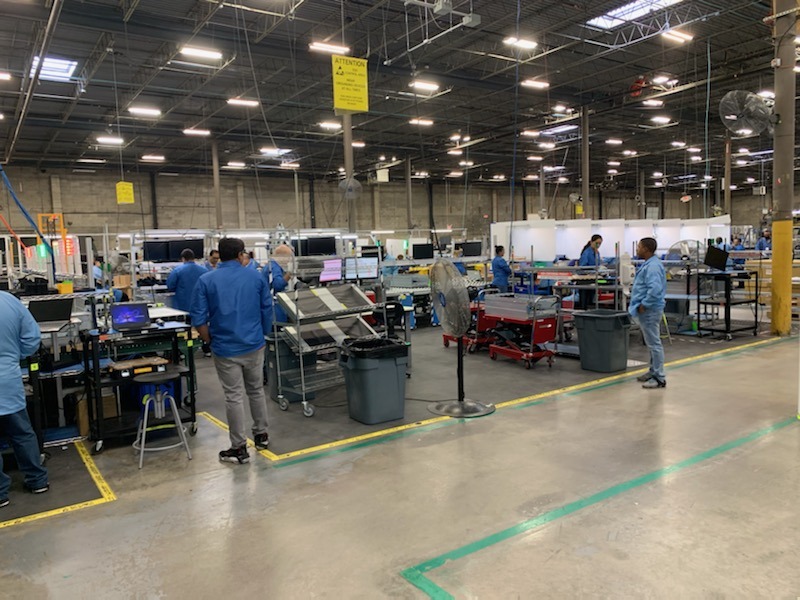
He also visited was at IBM’s Thomas J. Watson Research Center in Yorktown Heights, NY. There he learned about the groundbreaking research occurring at the center on AI, semiconductor performance, high performance computing, and quantum.
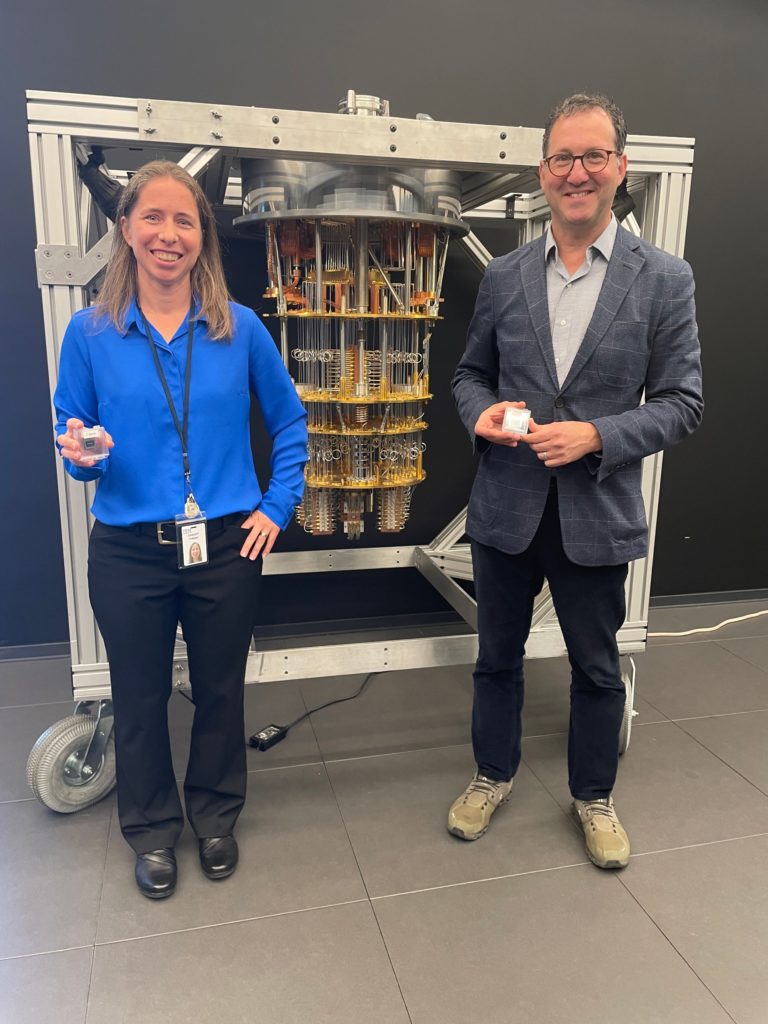
You can learn more about how the tech industry is helping drive innovation and competition throughout the United States here and its impact in the state of New Jersey and New York. Stay tuned for the next Innovation Across America trip.
Strong Supply Chains Critical to Infrastructure Funding
Innovation Across America: ITI’s President & CEO Visits Austin, Texas
For more than 100 years, ITI’s members have been creating new technologies in communities across the U.S. that have become a foundation for the economy and society, creating jobs and making the U.S. more innovative and competitive. To highlight how key policies support the technology industry, ITI’s President and CEO Jason Oxman is traveling across the country to visit ITI member companies and see the impact of innovation happening across America.
Jason’s first stop was in Austin, Texas. There, he visited AMD (Advanced Micro Devices) and saw many of the groundbreaking technological advancements AMD has developed to help solve major challenges facing the world. AMD designs and develops semiconductors that support the larger tech ecosystem and are critical to supporting advancements in areas like healthcare, sustainability, entertainment, science, and automotive.
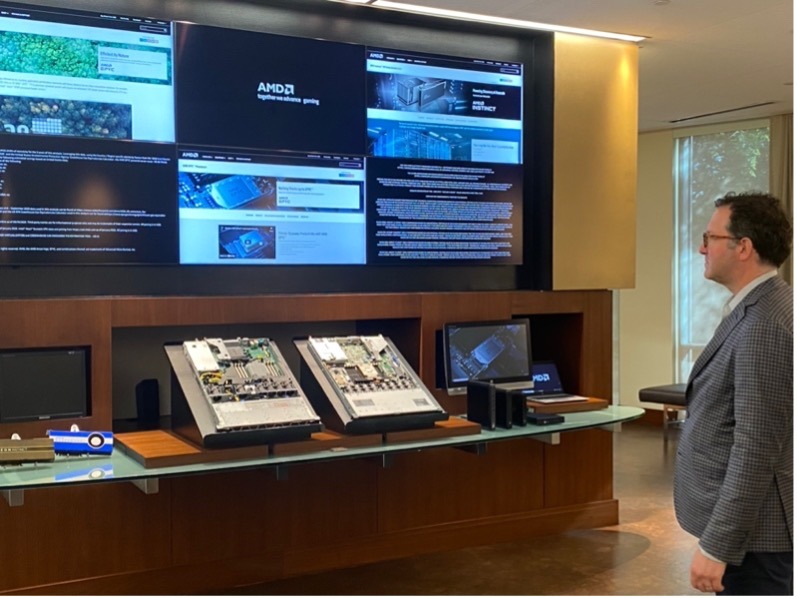
Jason also toured Samsung’s semiconductor foundry in Austin. Jason learned more about Samsung’s investments in chips development in Texas and its world-class facility, which primarily focuses on the production of 14nm and 28/32nm chip technologies. This facility had a $6.3 billion total economic impact in Central Texas in 2021, supporting nearly 10,000 jobs. Samsung is scheduled to open a new semiconductor facility in Taylor, Texas in 2024 to expand its semiconductor manufacturing capabilities in the U.S.


On his final stop in Austin, Jason joined Dell for a tour of the Texas Advanced Computer Center (TACC) at the University of Texas at Austin, which designs and deploys computing technologies to power discoveries that change the world. TACC is a prime example of how public and private sector partnerships are critical in advanced computing. The tour of TACC highlighted its leading-edge resources in high performance computing, visualization, data analysis, storage, cloud, data-driven computing, connectivity, and more.
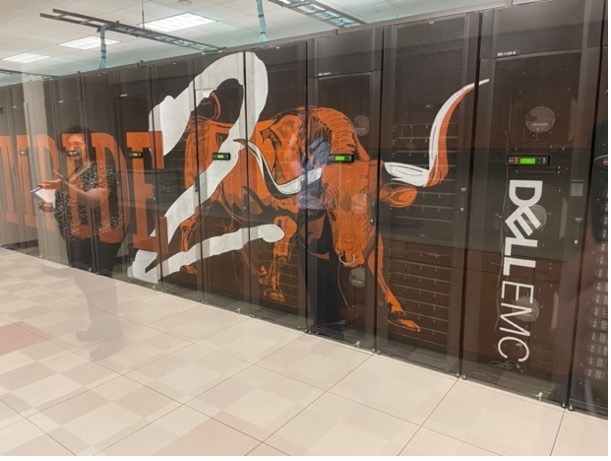
Through its partnership with Dell and other industry leaders, TACC helps address some of society’s most pressing challenges including combatting the COVID-19 pandemic, developing next generation weather forecasting, and exploring the depths of the universe.
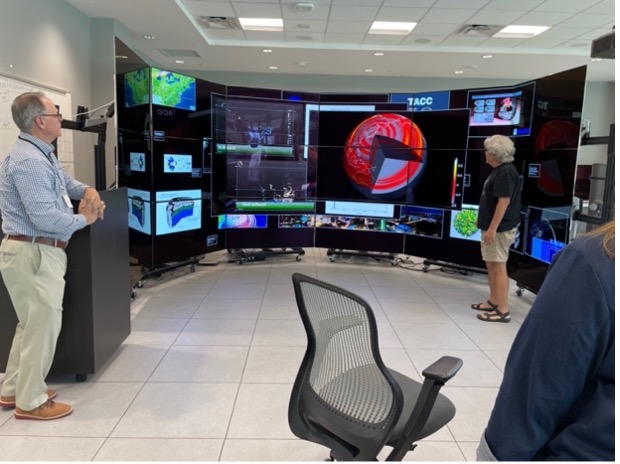
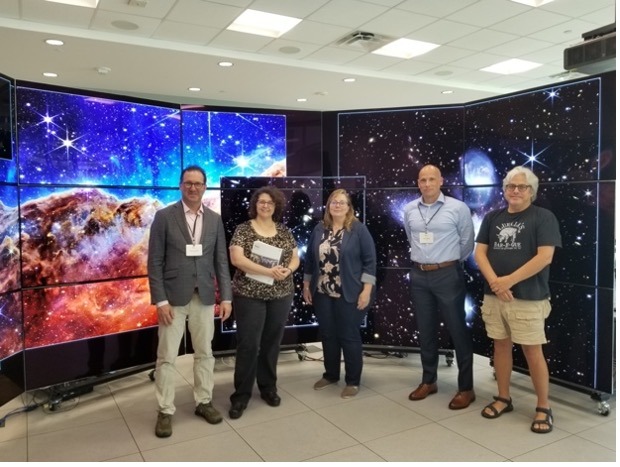
You can learn more about how the tech industry is helping drive innovation and competition throughout the United States here and its impact in the state of Texas here. Stay tuned for the next Innovation Across America trip.
Strong Supply Chains Critical to Infrastructure Funding
Seagate Career Prep
Seagate employees in California, in partnership with San Jose State University and Santa Clara University, mentored local students with a series of virtual panels. These events offered advice for students preparing to start their careers.
Seagate employees provided interview practice, networking tips and other helpful career-related advice to teach college students useful skills for entering the workforce. Students and mentors were able to make direct connections in spite of the virtual format of the event.
“The new partnership was a success, with university representatives giving a resounding appreciation for Seagate’s efforts.”
You can read more about Seagate’s work here.
Kyndryl: One Tree Planted Partnership
Kyndryl recently announced it would partner with One Tree Planted to plant 88,449 trees around the world.
Kyndryl works with a large client base to design and manage important technological systems around the world — ensuring these operations run efficiently and securely. The trees represent the company’s broader commitment to sustainable technologies and cutting emissions. With these initiatives, Kyndryl aims to increase efficiency and reduce emissions in its operations.
“This program aligns perfectly with our Kyndryl values. The roots of trees provide strength to grow tall and strong, but we know they don’t act alone. Their roots intertwine to create vibrant ecosystems that support a diverse array of life around them. Every tree represents a Kyndryl, the people who work with our customers at the heart of progress, powering the vital systems that keep entire industries moving forward.”
You can read more about Kyndryl’s work here.
Keysight After School Program
Keysight uses its after-school program to enhance children’s STEM education with a series of hands-on science projects. Students design and work with engaging scientific technology including electronic-circuit games, balloon-powered cars, clean water engineering, weather stations and more.
Keysight provides funding and volunteers for the program at no cost to students and participating organizations. Students are able to take home their final projects where they can share their discoveries with family and friends and delve further into the field. The program is primarily utilized in schools but can be hosted in community centers, museums, hospitals and other venues as well.
“Keysight After School is a hands-on science program for children between the ages of 9 and 13 years in communities where the company has a presence. Keysight After School features 23 different hands-on life, physical and earth-science experiments designed as complete “programs-in-a-box” with all the materials needed for students to implement various science-based experiments.”
You can read more about Keysight’s work here.
Strong Supply Chains Critical to Infrastructure Funding
Digital infrastructure provides the foundation for Americans to enjoy the economic and social benefits that come from a reliable online economy. It gives us access to virtual healthcare services and online education. It helps small businesses sell products and services online. And it enables remote working for businesses and organizations of all sizes.
Passage last year of the Infrastructure Investment and Jobs Act guaranteed historic federal funding to not only improve our current networks and infrastructure but to help close the digital divide and deliver more clean energy to our grid. This is a massive investment in our future and promises to improve the lives of Americans for decades to come.
It’s important to recognize that innovation does not happen in a vacuum.
However, it’s important to recognize that innovation does not happen in a vacuum. Resources such as a reliable global supply chain are critical in helping industries keep America at the forefront of the development and deployment of broadband infrastructure.
While it is vital that we continue to expand supply chains and manufacturing here in the United States, global companies must be able to continue tapping into the global supply chains that will provide full access to materials. Rigid domestic sourcing requirements threaten the success of this funding.
The technology industry has proven that it is possible to expand domestic labor and manufacturing opportunities which promote economic growth, while also using the global supply chain when beneficial to further innovation. This progress must be kept in mind as policy is developed and implemented.
Strong Supply Chains Critical to Infrastructure Funding
Juniper Networks: Connecting Others to Opportunity
Juniper Networks is collaborating with a range of charitable organizations to provoke change in the world through a diverse set of interests. Juniper is investing in STEM education initiatives to empower girls and underprivileged youth populations in local schools. Juniper has partnered with several organizations to help advance these efforts, including Girlstart, Hidden Genius Project, and Project Learn.
Additionally, Juniper has put forth robust relief efforts in response to natural disasters to help communities rebuild and revitalize. Since 2015, the company has donated more than $1 million to support relief efforts worldwide. Juniper also emphasizes the importance of volunteering to help support the communities it’s connected to. That’s why every full-time employee is entitled to five paid working days a year that can be spent volunteering for a cause they’re passionate about. Through Juniper’s Matching Gift Program, the company matches donations up to $1000 per year, per employee.
“From STEM education to disaster relief and community volunteering, we partner with charitable organizations whose values align with ours to power connections and empower change in the world.”
You can read more about Juniper Network’s work here.
Dell Technologies: Addressing the Gender Gap in Tech
Dell Technologies is working to promote equality and equity in the workforce. To do so, Dell is pledging that at least 50% of participants in its social and educational initiatives will be women or people from underrepresented groups.
Dell has already seen success with this goal in China from its collaboration with the Chinese Women’s Development Foundation. Since 2016, Dell Technologies has provided support for women at Chinese universities majoring in information and communication technology subjects. It has offered classes, workshops, and seminars to help women thrive in the tech industry.
“To align with our goals of increasing the number of women and underrepresented groups within the Dell Technologies workforce, we want at least half of the participants in our social and educational initiatives to be from those same groups.”
You can read more about Dell’s work here.
Honeywell: Using STEM Skills to Explore the Future of Fashion
Honeywell believes early STEM education will drive the next generation of innovators. The company recently joined forces with Kelly Oubre, an NBA player for the Charlotte Hornets, as well as Digi-Bridge, an educational non-profit, to provide 3D printers and teach students about how STEM can be implemented in the fashion industry. Students at Governors’ Village STEM Academy in Charlotte, North Carolina worked with Oubre to design accessories for him to wear to his games.
With the help of Honeywell, students transformed their fashion ideas into 3D-printed wardrobe items such as cuff-style bracelets, pendant necklaces and earrings.
“The project, a partnership between Honeywell, the Charlotte Hornets, and the education non-profit Digi-Bridge, got students thinking about how science, technology, engineering and math (STEM) can help power innovative fashion design.”
You can read more about Honeywell’s work here.
Rapid7: Access to Free Open Source Cybersecurity Tools
Rapid7 maintains and supports numerous open-source and community-sourced cybersecurity projects to help bring powerful security to all. These free tools give people access to the capabilities and information they need to defend themselves, regardless of their location or background. Rapid7 believes that it is only through wide access to tools and data that we can move the security industry forward.
“I think the number one key to our success is the diversity of our contributors. We have contributors from all over the world, from lots of different backgrounds, many of whom are not professional software engineers. They’re hackers. They’re hobbyists. They’re tinkerers. They’re QA people. They’re IT people. They’re doc writers. And so that just in and of itself has been really, really, really helpful for us.”
You can read more about Rapid7’s work here.
Intel: Expanding Digital Readiness
Intel works with its communities to close the digital divide. The company partnered with schools, ecosystem partners, local governments, teachers and device manufacturers to distribute laptops and bolster connectivity in communities, providing a solutions-based online learning approach to a million students globally. In the U.S., Intel provided a remote learning solution to students in over 15,000 families representing 45 school districts that serve Title 1 students. Working with First Book, CDW, and other partners, Intel also launched the Creating Learning Connections Initiative, providing students and educators access to critical tools and resources, including Internet connectivity, technology devices, and hands-on STEM learning solutions.
“COVID-19 has exacerbated the technology and educational inequities in communities of need. Now more than ever, it is critical that we come together with partners to combine our unique assets and capabilities to ensure that students have access to a meaningful virtual learning experience.”
You can read more about Intel’s work here.
Canon: Yellowstone Forever
Since 1995, Canon U.S.A. has partnered with Yellowstone Forever on an education and research project called Eyes on Yellowstone. It contributes to important scientific research and helps break new ground in conservation, endangered species protection, and the application of cutting-edge science and technology that is essential to managing Yellowstone National Park’s delicate ecosystems and wildlife. Other programs include old faithful geyser live!, a streaming webcam of the park’s gem, and a series of educational web videos and podcasts.
“At the heart of every product, every idea, and every initiative lies the thought, “how will this make the world a better place?” Canon U.S.A.’s deep belief in being socially responsible is what drives our passion and support for programs that support the environment as well as the local communities we’re a part of.”
You can read more about Canon’s work here.
SWIFT: Caring for Our Communities
SWIFT strives to improve education through the support of associations that help children and young adults in need. SWIFT supports SOS Children’s Villages, an international development organization that works to meet the needs and protect the interests and rights of children worldwide. Following natural catastrophes and disease outbreaks, SWIFT’s staff members contribute to relief efforts across the globe, and SWIFT matches each staff donation.
In response to the crisis in Ukraine, SWIFT continues to support economic stability, resiliency and prosperity across the global financial system, to support long-term resolution and recovery as well as support politically neutral humanitarian organizations through its corporate social responsibility programs.
“Our business is global. SWIFT works with and for financial communities across the globe. We know this is a privilege as well as a responsibility, and we are committed to making a positive impact wherever we can.”
You can learn more about SWIFT’s work here.
Zoom Cares
Zoom is committed to a future where all people and the environment are cared for. Their initiative, Zoom Cares, is creating that future by bringing the best of Zoom to help solve some of humanity’s biggest challenges. It deploys funding, technology and technical expertise to address issues in education, social inequity, climate change and mental health. It supports these goals by offering non-profit discounts, encouraging employee volunteerism and matching employee donations dollar-for-dollar.
“These dark and difficult times are illuminated by the people and organizations working tirelessly each and every day to care for their communities. Some are on the ground in local neighborhoods, and others are building networks worldwide. They are delivering essential services, helping to improve access to education and mental health care and providing a safe space for those who need it.” – Eric Yuan, CEO
You can read more about Zoom’s work here.
Twilio Impact
Twilio believes that when people have access to the information and resources they need, they can take action to improve their outcomes and long-term wellbeing. That’s why the company worked to drive better outcomes across the vaccine lifecycle.
Twilio contributed $10 million to Gavi, the Vaccine Alliance that supports COVAX, an initiative to provide vaccines to low and middle-income countries. Twilio grantees and customers are also using on-the-ground expertise and technology to solve complex distribution challenges and the company is also partnering with organizations to build vaccine understanding and confidence. Finally, many organizations are using Twilio to connect to people directly and increase vaccination rates by communicating availability, booking appointments and delivering reminders about subsequent shots.
“For me, Twilio has been THE stand-out technology company that has really put action behind words to support vaccine equity. The company has not only led through substantive funding but equally through the team’s energy, creativity and sheer dedication to get a product to market that actually aims to change things for the future.”
You can read more about Twilio’s work here.
Qualcomm: Inspiring the Next Generation of Inventors
Qualcomm is committed to nurturing and equipping future innovators with the skills and knowledge to solve global challenges. It works to foster a diverse and inclusive workforce by advancing STEM education for students at all levels and from all backgrounds.
Qualcomm’s Thinkabit Lab shows students how they can be part of inventing a wireless future through hands-on projects and has inspired 85,000 students as of 2021. Qualcomm also collaborates with FIRST, a leading nonprofit that engages PreK-12 students in robotics programs, and Million Girls Moonshot, which aims to inspire one million more girls to receive STEM education through after-school and summer opportunities by 2025.
“This challenge has opened my eyes to this new world of innovation, engineering and entrepreneurship that I never really saw myself pursuing in the past. I now see myself as more than just a female in this male-dominated field, but as an effective contributor and innovator in STEM.”
You can read more about Qualcomm’s work to inspire the next generation of inventors and about countless other projects for good here.
Oracle: Changing lives globally with free computing resources
Oracle Academy advances computing education around the world to increase knowledge, innovation, skills development and diversity in technology fields. By providing free tools and training, the program helps educators in more than 120 countries engage, inspire and prepare millions of students to become college and career-ready technology innovators and leaders.
“Now, more than ever, teachers need virtual resources to keep learners engaged. Oracle Academy supports its member educators with free teaching and learning resources, all available online using a browser.”
You can read more about Oracle’s work here.
IBM Science for Social Good: Prescription Guidelines for Opioid Epidemic
IBM is in a unique position to uncover new insights to address the opioid epidemic. Its Science for Good program focuses on analyzing the relationship between factors surrounding an initial opioid prescription and a subsequent diagnosis of addiction. The goal is to identify causal (and not merely correlated) factors that lead to an addiction diagnosis.
IBM’s work represents the beginning of a long and potentially far-reaching mission to make inferences about undiagnosed individuals in order to offer guidelines on opioid prescriptions.
“Overall, our vision is to draw upon the richness of IBM’s claims and other healthcare data to deliver insights tailored to the needs of different stakeholders. With an epidemic of this magnitude, such joint efforts are clearly needed.”
You can read more about IBM’s work here.
HP: Amplify Impact
HP’s Amplify Impact program is an industry-first partner assessment, resource and training program aimed at driving meaningful change across its three sustainable impact pillars:
Planet – with an emphasis on climate change; People – with an emphasis on human rights and social justice; and Community – with an emphasis on bridging the digital divide.
The program empowers partners to set bold, long-term objectives. HP aims to enroll at least half of its HP Amplify partners in the voluntary Impact program by 2025.
“The strength and reach of our ecosystem are substantial and by bringing our partners with us on this journey, we can work together to create a more sustainable and just world.”
You can read more about HP’s work here.
Closing the Rural Broadband Gap
The Microsoft Airband Initiative advances digital equity — access to affordable internet, affordable devices, and digital skills — as a platform for empowerment and digital transformation across the world. Microsoft’s strategic approach brings together public and private organizations and aims to provide access to broadband for three million people in unserved rural areas of the United States by July 4, 2022.
“While Covid-19 created a national crisis, it also laid bare the devastating impacts the digital divide has on Black, African American, Latinx and Hispanic communities. But it also created momentum: People are more aware of the problem and are willing to move quickly to fix it.”
You can read more about Microsoft’s work here.
Restoring 100 million trees by 2025 with the Priceless Planet Coalition
Human activity increasingly puts our planet’s most essential forests at risk. MasterCard wants to combat this threat. That’s why The Priceless Plant Coalition will employ a forest restoration model dedicated not only to the planting of 100 million trees, but also to the regrowing of forests in geographies that represent the greatest global need.
“The green transition is happening, but not at the speed needed. As citizens, businesses, and societies, we need to cut emissions faster and deeper and at the same time step up efforts to preserve land and forests and enhance natural sinks.”
You can read more about MasterCard’s work here.
Logitech's Hopecam Partnership
Children with cancer often experience isolation during an already difficult time in their lives. Hopecam helps them connect with their friends, their classrooms, and their support systems while going through treatment. Each child receives a tablet computer with a webcam and internet access in their home. Hopecam relies on Logitech video conferencing technology to provide essential face-to-face contact.
“Hopecam’s mission is to allow children to socialize, sharing the normal events and conversations of childhood, from celebrating a birthday to checking out who has lost a tooth.”
You can read more about the partnership here.
Building community and boosting grades with esports
GOAL High School is constantly seeking creative ways to engage its at-risk students. That’s why it turned to Lenovo to help found its first-ever esports league. Lenovo donated time and expertise to build an esports program from the ground up — and founded a $20,000 scholarship in the process. The program motivates students to complete their academic work and gives them a sense of purpose.
GOAL isn’t the only academic institution supported by Lenovo. At the University of North Carolina, the company recently constructed a massive gaming arena equipped with nearly 40 top-of-the-line Legion computers, designed especially for gaming, along with keyboards and headsets. Lenovo also provides expertise and ongoing tech support. The program has grown from 300 to 800 students in just three years.
“As a longtime champion of data, creativity, and connectivity, Lenovo offers a multitude of resources for academic institutions, such as financial support, student scholarships, infrastructure, licensing assistance, and of course, expertise.”
You can read more about Lenovo’s work here.
Celebrating Earth Day 2022
The impact of climate change on landscapes, communities, and the planet is a shared experience across the globe. From our water supplies to the air we breathe, climate change knows no borders. This Earth Day, we were reminded of the importance of acting with speed and efficiency to put in place safeguards that will protect our planet for future generations.
The technology industry is working hard every day to enable sustainability and emission-reducing solutions across communities and economies.
“Addressing climate change will require accelerating innovation…”— ITI President and CEO Jason Oxman
ITI members are leading tech sector efforts to ensure that people around the world will continue to have access to resources and materials for generations to come. Our companies are consistently innovating throughout the entire product lifecycle, from materials sourcing to environmental design, to energy efficiency and proper end-of-life management.
However, ensuring Earth’s longevity and viability is a herculean task. It requires broad partnerships and problem-solving across industries and governments. ITI strongly advocates for public policy and international partnerships, such as the Paris Agreement, that provide the proper funding and programs aimed at avoiding irreversible damage to societies, economies, and the planet.
You can learn more about the tech industry’s commitment to creating a healthier, more sustainable planet at bridgeforinnovation.org.
Leading the Charge on Equal Pay
Salesforce has been leading the charge for equal pay for women since 2015, with their leadership being called on to spread their knowledge and experience across sectors from news organizations, industry events, and multiple White House administrations. Salesforce has also advanced from just working towards women’s equal pay to incorporating considerations for race, as minorities – especially minority women – are systemically paid less than their white and/or male counterparts. Salesforce’s years of work in pay equity has not only improved the lives of their employees but also pushed the rest of the tech sector to improve their payment methods in order to stay competitive – truly a rising tides raise all ships scenario.
“While there is more work to be done in order to reach pay equity across the board, Salesforce has shown year after year that they are up to the challenge. CEOs with one button on one computer can pay every man and every woman equally,” Salesforce Chairman and CEO Marc Benioff said. “We have the data.”
In 2021, analysis found that 3.5% of Salesforce’s global employees required adjustments. Of those, 81% were based on gender, and 19% were based on race or ethnicity. As a result, Salesforce spent $3.8 million to address any unexplained differences in pay, making their investments towards equal pay a total of more than $16 million to date.
You can read more about Salesforce’s history of work on equal pay in the following links: 2021 Equal Pay Study, In the News, Equal Pay Strategy, At the White House
Motorola Solutions is creating the future of security
Motorola Solutions is not a new name in the security industry. They are best known for their two-way radios that help security professionals keep in touch while they work, but radios aren’t the only thing coming out of Motorola’s labs. Motorola has designed a security ecosystem, combining the power of radio, video security and analytics, and evidence management software – powered by AI and Cloud technologies – to improve public safety and business security.
Motorola has designed this technology to be a powerful aid to the expertise of safety officials, in order to help them work more efficiently and effectively, while also innovating their base AI to be held to the highest ethical standards.
You can read more about Motorola’s work here.
Tech leaders come together to forge a path forward through the challenges of COVID
Honeywell and Twitter have found that utilizing the tools Salesforce offers has not only allowed their businesses to continue operating during the pandemic but have also found ways to continue to innovate and improve their business for both employees and consumers via remote options. With Salesforce, Honeywell has been able to meet their customer’s needs along with the technical requirements for their support staff with the flexibility that the changing nature of Covid has required. Twitter has been able to utilize Salesforce in order to transform its business operations which has allowed them to learn from the data they collect to spot trends early, adjust strategies to stay close to its customers, and improve sales, marketing, and HR outcomes.
The future of innovation is coming at an increasingly fast pace, and tech companies – the bridge for innovation – can work together as Salesforce, Honeywell, and Twitter have to continue to build new tools that we can all utilize to overcome the challenges of our time.
For more on this story, you can read details or watch videos made in partnership with The New York Times here.
Google works with the Biden Administration to make open source software more secure
On January 13, 2022, Google joined with other technology industry leaders at the White House Open Source Software Security Summit to help inform the Biden Administration on ways to strengthen cybersecurity. Open source software code is available to the public, and free for anyone to use, modify, or inspect. Because it is freely available, open source software is used for everything from corporate innovation to national security systems and international projects. However, despite its importance, the security of these systems is only maintained on an ad-hoc volunteer basis.
Google utilized this meeting with the Biden Administration to advocate for the creation of an organization to act as a marketplace for open source maintenance; matching volunteers from companies with the critical projects that need the most support.
You can read more about Google’s open source work here.
West Virginia is leading the charge in Toyota’s electrified future
Toyota has made the commitment to offer an electrified version of every vehicle across its entire lineup of both Toyota and Lexus vehicles by 2025. This commitment to the production of alternative-powered vehicles (APVs) such as hybrids, plug-ins, fuel cells, and completely electric vehicles, will help Toyota reach its goals for carbon neutrality. In November 2021, Toyota West Virginia took the lead in doing the work of this commitment by making a $240 million investment to add a dedicated production line of hybrid transaxles.
This new line will provide new equipment and operational upgrades to modernize the facilities. The most important result of the investment is that it will enable the training of plant employees to diversify their skillset and play a larger role in Toyota’s electric future.
This investment in West Virginia’s future garnered endorsements from West Virginia’s Governor Jim Justice, and Senators Joe Manchin and Shelley Moore Capito.
Learn more about this valuable program here.
Mastercard’s Girls4Tech program inspires girls around the world to build technology skills
Girls4Tech is an educational program in which Mastercard employees teach a STEM curriculum based on global science and technology standards which features Mastercard’s payments technology, including algorithms, encryption, fraud detection, data analysis, and digital convergence in order to help girls ages 8-16 build the skills that will help them become the leaders of tomorrow.
Mastercard has built upon their momentum by furthering their investment in Girls4Tech, announcing a new goal of reaching five million girls by 2025.
Now in its seventh year, Girls4Tech has reached over 1.5 million girls in 44 countries. Due to COVID, Girls4Tech innovated by releasing a website in collaboration with scholastic to meet at-home students’ needs by opening access to the students, as well as their teachers and parents.
Learn more about this valuable program here.
Tech in Action for 2022
Tech is a crucial ingredient to shared prosperity and a more equitable, secure society that enjoys better health outcomes and superior educational opportunities for all. Good policy can make our lives better, ensure our economy is strong and support good jobs and opportunities in which innovation can flourish.
The State of the Union comes this week as the list of pressing issues to address seemingly grows longer by the day. It is important to ensure that industry and government are working together to deliver a future that Americans deserve.
Tech and sound policy can both help address today’s most daunting challenges while laying the foundation for a future in which all communities can thrive.
ITI understands that the tech industry must serve as an important partner in helping drive critical policy initiatives to promote U.S. competitiveness and lift up the U.S. economy. The Bridge for Innovation campaign underscores this spirit of innovation, partnership, and the importance of smart and purposeful policy.
ITI has put forward several policy priorities where the United States can make significant progress in 2022 for the benefit of businesses, workers, and consumers across virtually every sector of the economy. The below priorities included in ITI’s suggestions mirror the policy focus of the Bridge for Innovation campaign.
Viability
- Support Technology Research, Development, and Manufacturing
- Advance a Tax System that Promotes Growth and is Globally Competitive
- Accelerate Broadband Deployment to all U.S. Communities
Security
- Pass Federal Privacy Legislation
- Ensure A Consistent and Coordinated Approach to Cybersecurity
- Bolster Supply Chain Security
Equity and Opportunity
- Expand Strong, Inclusive Digital Trade Commitments
- Develop the Workforce of the Future
Read ITI’s Action Plan for 2022 to see how the global technology industry is committed to driving America’s economic competitiveness.
Intel and Dell partner with America’s community colleges to provide AI labs and education to more students
Intel and Dell Technologies have partnered with the American Association of Community Colleges (AACC) to create the AI Incubator Network as a part of Intel’s AI for Workforce program, which will design and build AI labs across the country utilizing the expertise and connections of America’s community college system. Each selected community college will be provided 12-month grants of $40,000 each to build out their AI labs.
In addition, Intel will be providing $400,000 in funding as part of its RISE Technology Initiative, Dell Technologies will be providing technical expertise to allow the 10 selected schools to teach students in-person, hybrid, or online, and AACC will support the implementation of the AI labs in colleges that choose to participate in this program.
“Building upon Intel’s partnership with the American Association of Community Colleges and Dell by establishing incubators for emerging technology education across the U.S. will provide greater access to critically needed technical skills and training in AI. This specialized program is a starting point for the next generation of U.S. technologists, engineers and inventors to expand their innovative thinking and go on to land careers in all sectors of the digital economy.”
— Michelle Johnston Holthaus, Intel executive vice president and general manager of the Client Computing Group
Learn more about this program here.
Fortinet is changing cybersecurity to meet the demands of the modern work environment
When the workforce largely transitioned to the work-from-home model, the number of network access points rose astronomically. Network security was strained in many company networks while they became open to a host of new security challenges due to the access from home offices and public networks. To address these challenges, Fortinet developed a new long-term strategy for the workforce by blending security and connectivity through services and such as software-defined wide-area networking, secure access service edge, zero trust access, and zero trust network to protect networks no matter where employees are accessing them from.
But the biggest change Fortinet has proposed is changing to organizational structure and culture to achieve a convergence of security and infrastructure by removing organizational silos so security can be seamlessly deployed across every network edge.
Forward-thinking business leaders are investing in new converged technologies. Advanced solutions that blend connectivity and security into a single solution—like software-defined wide-area networking (SD-WAN), secure access service edge (SASE), zero trust access (ZTA), and zero trust network access (ZTNA)—protect hybrid networks by extending enterprise-grade network connectivity and security functions to the home office.
This is essential for ensuring a temporary WFH policy becomes a long-term strategy for running a digital business. Making the right investments requires thinking about security and networking as a converged solution, a security-defined network approach, rather than as discrete elements.
Learn more about this valuable program here.
Accenture’s Tech4Good helps ensure clean drinking water in developing nations
Accenture Labs’ Tech4Good program, which uses cutting-edge applied research to help address critical societal challenges, began working with charity: water, a non-profit devoted to providing clean, safe drinking water to more than 11 million people in 29 countries.
Learn more about this valuable program here.
Dell Technologies is Changing the Face of Tech
Engage. Educate. Employ. In partnership with select minority-serving institutions, Dell is advancing diversity to transform the tech industry.
Through Dell’s unique curriculum, Develop with Dell, the tech company is empowering underrepresented minority students with free access to a world-class sales and STEM training program that enhances their marketability for roles across Dell Technologies, its customer and partner ecosystem, and the IT industry.
Learn more about Dell’s Changing the Face of Tech program here.
Mastercard Programs Focus on Black Female Small Business Owners
Small business owners across the U.S. were disproportionately impacted by shut-downs prompted by the COVID-19 pandemic. More than 40 percent of Black-owned businesses across the U.S. shut down between February and April of 2020, according to a study by the Federal Reserve Bank of New York.
To help small businesses owners recover, MasterCard has launched a number of programs to help, including the Strivers Initiative, a platform to increase the visibility of Black female business owners.
The initiative includes a grant program in partnership with Fearless Fund, a VC fund built by women of color for women of color. The partnership will also promote digital tools Mastercard has built to help small businesses build and bolster their digital presence and reach customers online.
Mastercard had previously announced a half-billion-dollar commitment to support Black communities over the next five years. That includes products, services, technology and financial support, as well as concentrated investments focusing on Black-owned businesses and providing Black people access to affordable financial tools and capital. Part of this program is focused on helping small businesses move online and provide access to products and services to potential customers.
Mastercard provides a Small Business Digital Readiness Diagnostic, a free online tool to help entrepreneurs understand their strengths and weaknesses across digital, and the Digital Doors curriculum, which helps ensure businesses have the right tools to maximize their digital presence.
Learn more about this Mastercard program here.
Intel Launches and Expands AI Degree Program Across the U.S.
The Intel AI® for Workforce Program launched in 2020 in partnership with the Maricopa County Community College District (MCCCD) in Arizona to create the first Intel-designed artificial intelligence (AI) associate degree program in the U.S.
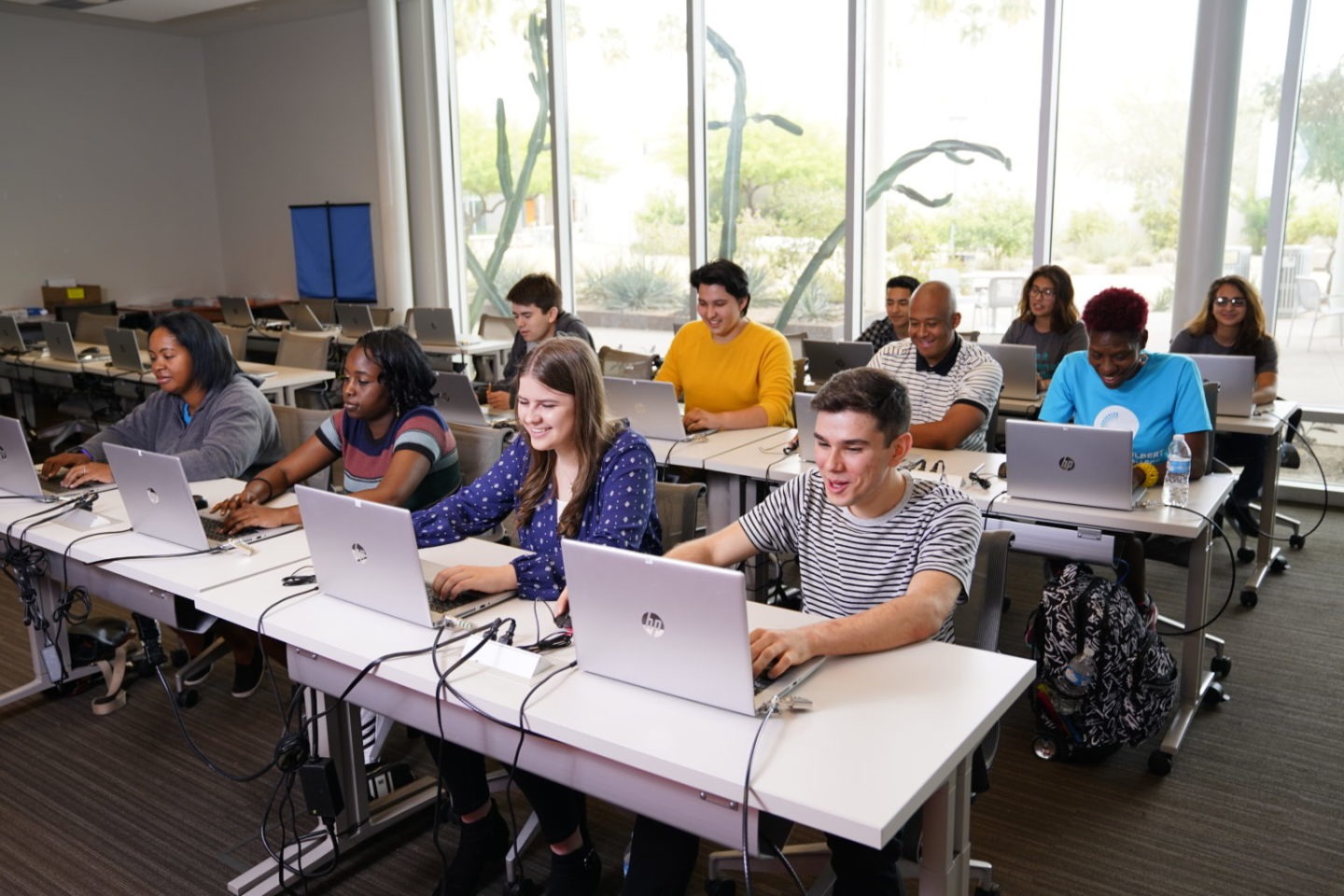
Students at Chandler-Gilbert Community College gather for a new student orientation in 2019. Intel is partnering with Maricopa County Community College District to launch the first Intel-designed artificial intelligence associate degree program in the U.S. The program’s first phase will be piloted online at Estrella Mountain Community College and Chandler Gilbert Community College in fall 2020. (Credit: Maricopa County Community College District)
MCCCD is one of the largest community colleges in the U.S. with more than 100,000 students across 10 campuses. With this degree program, students will learn fundamental skills such as data collection, AI model training, coding and ethics. In addition, Intel contributes technical advice, faculty training, summer internships and mentorships for students and faculty members.
In 2021, Intel announced a major expansion of its AI for Workforce Program across the U.S. The program had been added in 18 institutions across 11 U.S. states that serve a total of 800,000 students, and plans to expand to 50 more community and vocational colleges in 2022 are underway.
Programs like this are incredibly important to keeping the U.S. workforce competitive and ensure that Americans are keeping up with the global demand for artificial intelligence skills that are expected to grow exponentially. Learn more about the AI associate degree program here.
Siemens to Showcase Benefits of Digitization for FDA Review of Manufactured Medical Devices
In today’s fast-paced world, demonstrations of “the art of the possible,” combined with advanced digitalization and factory automation, are one way Siemens showcases how different processes and technologies can help prepare for potentially disruptive changes to design and production norms. This preparation and understanding can lead to more rapid responses to pandemics, such as the COVID-19 virus, as well as enhance our ability to respond to future emerging threats.
To support the FDA’s Office of Counterterrorism and Emerging Threats (OCET) advanced manufacturing program, Siemens will install and configure an advanced digital design and manufacturing showcase to demonstrate “the art of the possible” in creating digital twins and digital threads for some medical devices. This will include an actual manufacturing line with Siemens Digital Industries Software’s Xcelerator portfolio, including advanced integrated software capabilities for design control and risk management; product lifecycle management; product, plant, and process design modeling and simulation; manufacturing execution; closed-loop quality management; Industrial Internet of Things (IIoT) and much more. This advanced digital technology is already used in many industries, including aerospace, defense, automotive, and consumer products.
Creating and leveraging digital threads are an invaluable capability for both medical device manufacturers and the FDA. Digital twins and threads, with the use of integrated advanced modeling and simulation, can enable significantly better product design and performance with more optimized production. Digital artifacts can be reused across the lifecycle, creating efficiency, fewer mistakes, and increased quality. This capability can also help regulators better visualize product and manufacturing risks, provide more robust traceability and impact analysis, and enable more comprehensive data sets that are easier and faster to review. In summary, regulators will be able to respond much faster with more precision and with better information to both emergency and non-emergency needs.
Siemens’ long-term goal for this project is to use technology to help educate and drive digital thread adoption for both the manufacturers and regulators. That can lead to better patient outcomes and a more efficient and competitive industry.
Competitors Sharing Information to Protect Networks
Looking for new ways to keep internet users and data safe, leading cybersecurity companies formed the Cyber Threat Alliance to make it easier for otherwise fierce competitors to share threat intelligence information with each other to help keep everyone safer from attacks.
Palo Alto Networks and Fortinet were founding members of CTA in 2014 and those companies were soon joined by other large cyber companies, including Cisco and McAfee. The nonprofit organization has grown to 34 private sector members as well as partnerships with other cyber nonprofits and public sector industry groups seeking to improve the security of networks around the globe.
Member companies share actionable threat intelligence data in a timely manner so other companies can prevent, identify and disrupt attacks. CTA is actively growing around the globe and building diverse partnerships with information sharing and computer emergency responses teams across all sectors.
Organizations like CTA are incredibly important for helping protect US networks and consumers. Timely threat intelligence sharing can help keep the entire online ecosystem safer from ever-changing attacks from nation-states or cybercriminals.
Climate
Climate change is a complex, interconnected issue which will require broad partnership and problem-solving across industries and governments, as well as ideas brought forward by those with diverse experiences, voices and expertise.
Tech is playing a critical role in promoting global energy efficiency and combating climate change. ITI and our members seek to continuously improve the energy efficiency landscape in the U.S. and globally to leverage energy-efficient technologies. We’re supporting policies that prioritize the use of technology in helping mitigate and adapt to our changing climate.

Good policy supports and protects international partnerships, such as the Paris Agreement, that tackle climate change head-on. helps utilities bridge the gap between supply and demand for energy. It means investing in clean technologies, infrastructure and programs that only help address and minimize the impacts of climate change, but support global economic competitiveness and promote investments that help avoid irreversible damage to our economy, society and the planet.
